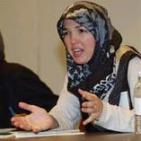 Six years after the Sept. 11 attacks, Americans should distinguish between mainstream Muslims and the radical fringe, the leaders said. “Muslim Americans feel an increasing level of tension and scrutiny in contemporary society,” said Ingrid Mattson, president of the Islamic Society of North America, the largest Muslim organization in the United States and the convention organizer.
Six years after the Sept. 11 attacks, Americans should distinguish between mainstream Muslims and the radical fringe, the leaders said. “Muslim Americans feel an increasing level of tension and scrutiny in contemporary society,” said Ingrid Mattson, president of the Islamic Society of North America, the largest Muslim organization in the United States and the convention organizer.
The image problems were among the topics most discussed by many of the 30,000 attendees. A fresh example cited was an open letter from two Republican House members, Peter Hoekstra of Michigan and Sue Myrick of North Carolina, that attacked the Justice Department for sending envoys to the convention because, the lawmakers said, the Islamic Society of North America was a group of “radical jihadists”. The lone Muslim in Congress, Representative Keith Ellison, Democrat of Minnesota, the keynote speaker here, dismissed the letter as ill informed and typical of bigoted attacks that other minorities have suffered.
Leaders of American Muslim organizations attribute the growing intolerance to three main factors: global terrorist attacks in the name of Islam, disappointing reports from the Iraq war and the agenda of some supporters of Israel who try taint Islam to undermine the Palestinians. American Muslims say they expect the attacks to worsen in the presidential election and candidates to criticize Islam in an effort to prove that they are tough on terrorism.
